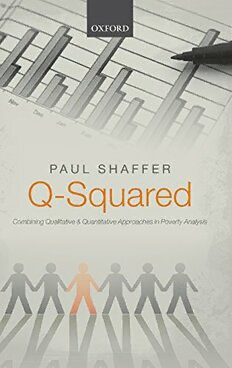Table Of ContentQ-Squared
00_Shaffer_Pre.indd i 7/9/2013 3:17:27 PM
This page intentionally left blank
Q-Squared
Combining Qualitative and
Quantitative Approaches
in Poverty Analysis
Paul Shaffer
1
00_Shaffer_Pre.indd iii 7/9/2013 3:17:27 PM
3
Great Clarendon Street, Oxford, OX2 6DP,
United Kingdom
Oxford University Press is a department of the University of Oxford.
It furthers the University’s objective of excellence in research, scholarship,
and education by publishing worldwide. Oxford is a registered trade mark of
Oxford University Press in the UK and in certain other countries
© Paul Shaffer 2013
The moral rights of the author have been asserted
First Edition published in 2013
Impression: 1
All rights reserved. No part of this publication may be reproduced, stored in
a retrieval system, or transmitted, in any form or by any means, without the
prior permission in writing of Oxford University Press, or as expressly permitted
by law, by licence or under terms agreed with the appropriate reprographics
rights organization. Enquiries concerning reproduction outside the scope of the
above should be sent to the Rights Department, Oxford University Press, at the
address above
You must not circulate this work in any other form
and you must impose this same condition on any acquirer
British Library Cataloguing in Publication Data
Data available
Library of Congress Cataloging in Publication Data
Data available
ISBN 978–0–19–967690–3 (Hbk.)
ISBN 978–0–19–967691–0 (Pbk.)
Printed in Great Britain by
CPI Group (UK) Ltd, Croydon, CR0 4YY
Links to third party websites are provided by Oxford in good faith and
for information only. Oxford disclaims any responsibility for the materials
contained in any third party website referenced in this work.
00_Shaffer_Pre.indd iv 7/9/2013 3:17:27 PM
To Patty, Shola, Maya, and Flo
00_Shaffer_Pre.indd v 7/9/2013 3:17:27 PM
This page intentionally left blank
Acknowledgements
I am deeply grateful to Ravi Kanbur, who initiated the Q-Squared initiative,
and invited me to join on. The momentum in favour of mixed method analysis
of poverty over the past decade has been highly infl uenced by Ravi’s efforts. In
the absence of such, this book would not exist.
I am also extremely appreciative of the support provided by the International
Development Research Centre (IDRC), Canada. The IDRC fi nanced a Q2
research project which supported the organisation of conferences in Toronto
and Hanoi, the development of a training programme, pilot studies and a
Working Paper series (presently on-line at <www.trentu.ca/ids/qsquared.php>).
Particular thanks go to Randy Spence for his continual encouragement, sup-
port, and wise advice.
The empirical chapters of this book benefi tted greatly from the feedback of
participants and discussants at a number of conferences and workshops over
the years, including: the International Conference on Poverty and Inequality,
United Nations Development Program and the World Bank Institute, Kuala
Lumpur, Malaysia, 11–13 December 2007; Q-Squared in Policy: A Conference
on Experiences of Combining Qualitative and Quantitative Methods in
Decision-Making, Centre for Analysis and Forecasting, Vietnamese Academy
of Social Sciences, Hanoi, 7–8 July 2007; the Chronic Poverty Research Centre
(CPRC) Workshop on Integrating Panel Surveys and Life History Methods,
London, Overseas Development Institute, 24–25 February 2006; the IDRC/
Poverty and Economic Policy (PEP) Program General Meeting, Colombo,
Sri Lanka, 13–17 June 2005; Q-Squared in Practice: A Conference on Experiences
of Combining Qualitative and Quantitative Methods in Poverty Appraisal.
Centre for International Studies, University of Toronto, 15–16 May 2004; the
Poverty Analysis and Data Initiative (PADI) Regional Workshop, World Bank,
Mombasa, Kenya, 7–8 May 2004; the Roundtable Meeting on Encouraging
Complementarities between Qualitative and Quantitative Poverty Appraisal,
Cornell University/Institute of Statistical, Social and Economic Research (ISSER),
University of Ghana, Accra. 21–22 May 2003; the UNDP Regional Workshop on
Poverty Reduction, Kathmandu, Nepal, 2–4 October 2002; the Conference on
Combining Qualitative and Quantitative Methods in Development Research,
Centre for Development Studies, University of Wales Swansea. Swansea,
vii
00_Shaffer_Pre.indd vii 7/9/2013 3:17:27 PM
Acknowledgements
Wales, 1–2 July 2002 and the Workshop on Qualitative and Quantitative
Poverty Appraisal: Complementarities, Tensions and the Way Forward, Cornell
University, Ithaca, NY, 15–16 March 2001.
Some of the theoretical materials in Chapter 2 originally appeared in
my unpublished DPhil thesis from the Institute of Development Studies,
University of Sussex, entitled ‘The Poverty Debate with application to the
Republic of Guinea’. I am particularly grateful to my supervisors, Michael
Lipton and Reginald Green, along with the Martin Greeley, William
Outhwaite, Peter Penz, and Paul Seabright, whose comments on materials
in this chapter led to signifi cant improvements. Support from the Social
Sciences and Humanities Research Council (SSHRC) of Canada, which facili-
tated completion of my thesis work, is gratefully acknowledged.
Most of this book was completed during a sabbatical from the Department
of International Development Studies at Trent University, Canada. I am very
fortunate to have excellent students and fantastic colleagues at Trent, on
whom I’ve tried out some of the ideas in this book over the years. In particu-
lar, I’d like to thank Haroon Akram-Lodhi, Feyzi Baban, Dana Barker Gee,
Chris Beyers, Winnie Lem, and Jackie Solway.
I am also very grateful to my editors at Oxford University Press for their
support, patience and understanding. Particular thanks are due Aimee Wright
and Adam Swallow.
My greatest debt is to my family, Patty, Shola, Maya, and Flo who put
everything in perspective.
viii
00_Shaffer_Pre.indd viii 7/9/2013 3:17:28 PM
Contents
List of Figures xi
List of Tables xiii
Part I. Introduction
1. Q-Squared: Combining Qualitative and Quantitative
Approaches to Poverty Analysis 3
Part II. Identifi cation: Who are the Poor and What are
Their Characteristics?
2. Foundations: Epistemology 15
3. First-Generation Q2 : Exploring Differences 29
4. Second-Generation Q2 : Addressing Comparability and Validity 4 3
Part III. Causal Analysis: Why are People Poor?
5. Foundations: Causation and Causal Inference 6 1
6. Q2 Causal Analysis: Exploring the Drivers of Poverty Status
and Dynamics 74
7. Q2 Impact Assessment: Evaluating the Poverty Impact of
Programmes and Projects 92
Part IV. Conclusion
8. Conclusion 1 07
Appendix 1: Q 2 Research Designs and Methods 119
References 131
Index 149
ix
00_Shaffer_Pre.indd ix 7/9/2013 3:17:28 PM

